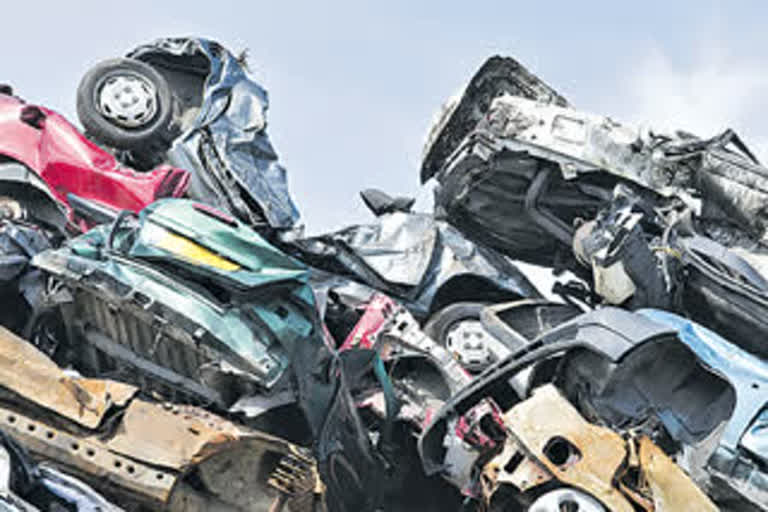New Delhi: Prime Minister Narendra Modi has dubbed the National Automobile Scrappage Policy a game changer, which will not only scientifically remove the old and unfit vehicles from roads to reduce the vehicular pollution and accidents, but it will benefit almost everyone in a positive manner and give a new identity to the country’s automobile sector.
While launching the Scrappage Policy, the Prime Minister listed out certain benefits, saying that modernization of mobility sector not only reduces the burden on travel and transportation sector, but it also supports the economic development. Prime Minister Modi said the policy would help in achieving the target of a clean, congestion free and convenient mobility for the country in the twenty-first century.
Circular Economy
Prime Minister Modi has often talked about waste-to-wealth, which means generating income by recycling waste material in a way that reduces pollution and waste material and provides livelihood to the people. He said the new policy is an essential part of a circular economy that is based on the three principles – reuse, recycle and recover, and it will bring investment of more than Rs 10,000 crore and provide impetus to the country’s quest to become self-reliant in metal sector. The Prime Minister said the time of launch of policy was crucial as India was going to witness a sea change in the next 25 years in the lifestyle of its citizens and the way business are run and industries are operated, and it was necessary to protect environment and resources.
Boosting supply of rare earth metals
In the launch event, the Prime Minister highlighted the country’s vulnerability with regard to rare earth minerals and metals. “The rare earth metals that drive technology are rare in any case, and the metals that are available today, no one knows when they would become rare. We can work on technology and innovation in future but the resources that we get from mother earth is not in our hands. That is why on the one hand today India is exploring new possibilities through Deep Ocean Mission and on the other hand we are promoting circular economy,” said the Prime Minister. “It is our effort to make development sustainable and environment friendly.”
Prime Minister Modi said the Scrappage Policy will give a big boost to auto and metal industries. “We imported scrap steel worth Rs 23,000 crore last year as the scrapping in our country is not productive. Energy recovery is almost zero,” he told the audience. Prime Minister Modi said existing scrapping methods used in the country are not able to recover the full value of high-strength steel alloys, neither they can recover rare earth metals. He said the country would be able to recover rare earth metals from scrap by using scientific technology based scrapping.
Automated Fitness Testing Centres
Prime Minister Narendra Modi said under the new policy vehicles will not be scrapped just because of their age but there will be a fitness test at an authorized automated testing center and if the vehicle is found unfit then it will be scrapped in a scientific manner. “It will be ensured that the registered vehicle scrapping facilities that will be set up across the countries, they are technology driven and transparent,” he said.
Monetary benefits to vehicle owners
Prime Minister Modi said with the launch of Scrappage Policy, automobile sector has joined the circular economy that will also incentivize the vehicle owners. “Owners will get a certificate if they decide to scrap an old vehicle. Anyone having the scrap certificate will not have to pay registration charge for purchase of a new vehicle, and they will also be given some concession in road tax,” said the Prime Minister.
He said with the scrapping of a old vehicle, the owner would be able to save money on maintenance cost, repair cost and also save money due to the better fuel efficiency of the new vehicle. Prime Minister Modi said the third benefit is directly linked to human lives as old vehicles are accident-prone and purchase of new vehicles will reduce the risk of accidents and new vehicles will also be less polluting and environment friendly. “I believe old vehicle owners will not miss the opportunity to upgrade their vehicles after the launch of scrappage policy," the Prime Minister noted.
Employment generation
Prime Minister Modi said the new policy will energize the scrapping sector and the people engaged in the sector will get formal employment in fitness and testing centres. “Small traders engaged in the scrapping business can act as collection agents for authorized scrapping centres,” he said. Prime Minister Modi said Alang in Gujarat, which is already a hub for ship scrapping, has large trained manpower which can help it to develop as a recycling hub for old vehicles as well.
Development of world-class auto industry
Talking about the government’s vision for the auto sector for the next 25 years, Prime Minister Modi said the effort was to make the industry sustainable and productive and reduce the dependence on imports to the maximum extent possible. Prime Minister Modi said the automobile industry should have a clear roadmap for the next 25 years to make India self-reliant. “The country is moving towards a clean, congestion free and convenient mobility. Today, India is committed to provide safety and quality of global standard to its citizens that is why we directly moved to BS-6 from BS-4 standard,” Prime Minister Modi told the industry leaders on the occasion.
Prime Minister Modi said his government was committed for green and clean mobility and large scale policy interventions are made to achieve the goal, from research to infrastructure, be it ethanol blending, hydrogen fuel, or electric mobility. Prime Minister Modi said circular economy may be a new term for the country but it has been practiced in the country since ages as we are used to recycling and reusing the old stuff.



